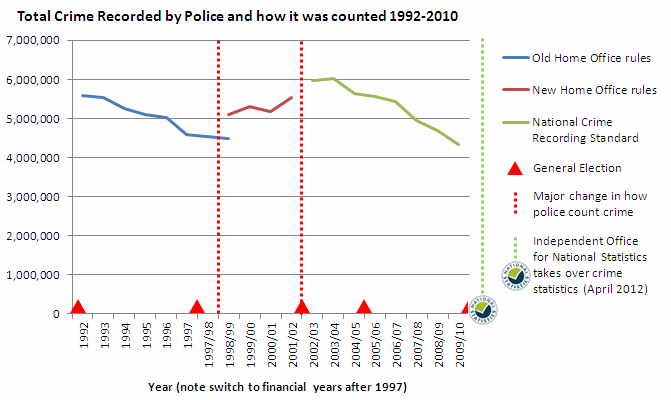Do politicians interfere with crime statistics?
"All politically significant statistics need to be mistrusted… There has also been a very great effort, since crime became politically significant probably 15 or 20 years ago, to massage the figures downwards."
Peter Hitchens, Today Programme, 24 May 2012
Mr Hitchens is only giving voice to what the public thinks: when the Office for National Statistics conducted focus groups on this in 2004 "the accuracy of crime statistics was 'universally distrusted'."
Politicians have realised this and perhaps realised that they don't get credit for things going well if nobody trusts the figures.
In April the government moved crime statistics out of the Home Office — which is after all responsible for keeping crime low — and into the independent Office for National Statistics.
The Home Office will still compile figures from police forces but the Office for National Statistics will be ultimately responsible for their quality and for reporting them to the public.
A 2010 review entitled Overcoming Barriers to Trust in Crime Statistics England and Wales concluded: "We have not seen any evidence that the current arrangements are subject to political interference, but perceptions are important."
Fair enough: the idea of Ministers popping downstairs to the statistics department and telling them what to write seems pretty far-fetched.
If we give the Government Statistics Service credit for having some integrity — and we do — then the review's conclusion is likely to be right.
However, politicians are involved in making choices about what is counted and how, and in one of the two main measures of crime, the police recorded crime figures, this has changed fundamentally twice over the past twenty years, and many more times since the figures started to be collected in 1898.

What gets counted changes frequently in minor ways. When the law redefines a crime, or a new crime is created, the figures must change to keep up.
There are also good reasons for major changes sometimes.
Before 2001, different police forces were counting offences differently, prompting the introduction of a National Crime Recording Standard.
The changes in 1997 included a number of serious offences in the figures for the first time, from common assault to possession of drugs. It is easy to see why that may have been thought a good thing.
Contrary to Mr Hitchens' claim, though, it made sure that the number of offences rose dramatically compared to the previous counting system. The 2001 changes did the same.
What was really unfortunate from the public's point of view was that these measures of crime could not be compared between the newly-elected government and its predecessor.
The latest review of crime statistics, which recommended their move to the Office for National Statistics, also recommended that in future: "Decision making on change that impacts on the published crime statistics series and trends must be transparent."
The Crime Statistics Advisory Committee drawn from both government experts and outsiders will advise on "any change in definitions, classifications or methodologies that will impact on time series" in future.
Conclusion
In contrast to Mr Hitchens' claim that governments were massaging the figures downwards, the biggest changes to the figures themselves raised the crime totals significantly, at the cost of the ability to compare between governments.
Nevertheless, it is certainly possible that changes elsewhere, such as in police priorities, might have lowered at least some of the figures.
Policy choices must be made about statistics. They will inevitably have a significant impact on the way crime is debated.
It is surely a good thing that now those choices will be made transparently by independent professional statisticians at the Office for National Statistics, who are accountable to the UK Statistics Authority.
The UK Statistics Authority is itself directly accountable to Parliament rather than to Ministers, and it has in the past shown itself to be pretty robust.
Mr Hitchens has invoked an easy cynicism with his radio remarks. It is both widely shared and to some extent justified. However, it is probably now time for that to be replaced by healthy scepticism and scrutiny.